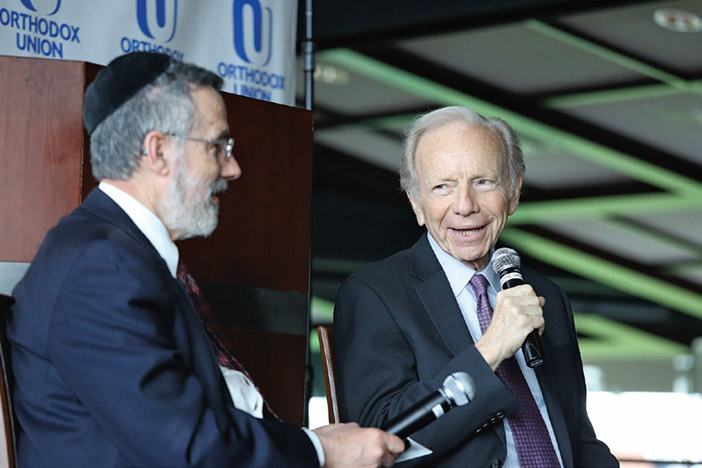



As anticipated, more than 2,000 participants came out on Sunday, April 29, to take part in a unique day of learning sponsored by the OU. For the second consecutive year, the OU invited scholars from throughout the U.S. and Israel, male and female, to present a variety of Torah thoughts from their own scholarly backgrounds and perspectives.
More than 30 illustrious speakers were featured throughout the day, which began with back-to-back Daf Yomi sessions. Speakers included Torah scholars and Jewish communal leaders, including Rabbi Hershel Schachter, Rabbi Dr. Tzvi Hersh Weinreb, Rabbi Mordechai Willig, Rabbi Dr. Abraham Steinberg, Rabbi Elazar Muskin, Rabbi Efrem Goldberg, Rabbi Yosef Tzvi Rimon, Rabbi Eli Mansour, Sivan Rahav Meir, Rabbi Judah Mischel and Rebbetzin Dr. Adina Shmidman. Former U.S. Senator Joseph Lieberman delivered a session with Rabbi Menachem Genack.
Six concurrent shiurim offered 45 classes as well as special programs for high school and college students. A plenary session titled “It’s Not What We Do; It’s Who We Are” brought the participants together for a stirring program featuring Allen Fagin, executive vice president and chief professional officer of the OU. Fagin compared the day’s event to a virtual replication of “ma’amad Har Sinai” where am Yisrael of all backgrounds came together as one unified nation.
“Klal Yisrael consists of so many shades and pathways. We are blessed with diversity and dimension. Torah NY has as its mission the unification of the community in its dedication to Torah and Torah study. We ask that you help us forge a greater connection to Torah and avodas Hashem,” said Fagin.
Rabbi Moshe Hauer, rav of Congregation Bnai Jacob Shaarei Zion in Baltimore, and Rabbi Efrem Goldberg, senior rabbi of the Boca Raton Synagogue in Florida, delivered divrei Torah focusing upon the value system we are provided with through Torah as well as the mission and purpose we are given through Torah study. These values and mission shape who we are as individuals who are mekadesh shem shamayim throughout the world. The recitation of Tehillim was led by Rabbi Adir Posy, followed by moving cantorial renditions of the Tefillah L’shalom Hamedina and the mi sheberach for chayalei Tzahal by Cantors David Berson, Yaakov Motzen and Zev Muller.
Special focus in this year’s program was placed on the commemoration of the 25th yahrzeit of Rav Joseph Ber Soloveitchik as well as the celebration of the 70th birthday of Medinat Yisrael. Rav Hershel Schachter, rosh kollel at Yeshiva University and posek for the OU’s kashruth division, spoke of the Rav’s “Man and Halacha, Man of Faith: How the Rav Found Hashkafa in Halacha.” Rabbi Yosef Adler, rav of Congregation Rinat Yisrael in Teaneck, spoke of “The Chosen City: Jerusalem, the Heart of Judaism.”
Other topics included Jewish Politics—Moral Concerns vs. National Interests; Addictions in Today’s World—Halachic and Hashkafic Perspectives; Quality of Life as a Consideration in Halachic Determination at the End of Life; #MeToo Through the Prism of Megillat Esther; Perfecting or Transcending Humanity—A Debate in Jewish Thought; Liberty and Justice Between Pesach and Shavuot; and the Convergence of Sephardi and Ashkenazi Traditions in Contemporary Israel.
In addressing the urgent current issue of tackling opioid addiction in the Orthodox community, Rabbi Dr. Tzvi Hersh Weinreb, executive vice president emeritus of the OU and a highly experienced clinical psychologist, pointed out that “Five years ago we had a problem with OFD youngsters, those who strayed ‘off the derech.’ Today our problem is with OD, overdosing on opioids.” Throughout his articulate presentation to a packed-house, Rabbi Weinreb explored the scientific understanding of the ever-growing contemporary issues of addictive substances and addictive behaviors. His juxtaposition of the issue to the traditional Jewish concept of “free will” was eye-opening.
Sivan Rahav Meir, who entitled her presentation “The Case of Modern Israel: Emunah in an Age of New Media,” is a rising star in Israel today through her capacities as a journalist and Torah scholar. As a reporter for Israel’s channel 2 news, Yediot Aharonot and IDF radio Galei Tzahal, she is a recognized national personality. Additionally, she gives weekly lectures about the parsha with hundreds in attendance. She has authored four books about Israel’s youth, including her most recent called #Parasha. Her message was the challenge of combining Torah and media. She recounted a recent interview she held with the now-retiring head of the Jewish Agency and former heroic refusenik Natan Sharansky and his wife, Avital. The Sharanskys, who are usually reluctant to be interviewed, shared that they had a very special message to convey.
“I want to tell my story to the Jewish people today, and especially the youth, because your heroism is greater than mine. When I was in jail in the former Soviet Union, the world was easily divided into black and white. Communism, the KGB and violence were black; democracy, freedom and peace were white. Today, when nobody is chasing us as Jews, it is harder for us to keep our Jewish identity and morality alive and vital. My message to you is to discern the differences between white and black, which are often hazy and unclear in today’s world,” Natan said. Sadly, Rahav Meir reported that when she addressed a group of American Jewish youngsters about Sharansky, fewer than a handful knew who he was.
OU President Moshe Bane, thrilled with the record attendance at the event, commented, “Learning Torah has always defined and shaped our community, giving meaning and context to everything, from how we pray to how we conduct our business affairs, to how we interact with our family and with society at large. What better way to shine a beacon on the importance of Torah study than by coming together as a community to hear from some of the world’s leading Jewish teachers, all in one place.”
To learn about the many ongoing OU projects, visit www.ou.org.
By Pearl Markovitz













